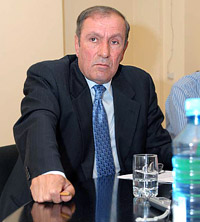Yesterday the activists of the Armenian National Congress held a meeting, during which the first president Levon Ter-Petrosyan came up with a speech, commented on the Armenia-Turkey protocols, the situation after executing the protocols and spoke about his opinion concerning the future developments. “…I think the following scenario is more possible: the Turkish parliament will delay the ratification of the protocols or will do it with some preconditions in order to stimulate the fast settlement of Karabakh conflict. And the Armenian parliament will be passive and will wait until the protocols are ratified by the Turkish parliament. By considering the issue of Karabakh as the main obstacle out of this deadlock, the international community will try to encourage the settlement, which complies with the interests of the international community. Serzh Sargsyan will refer to the sharp conflict between the people of Armenia and the Diaspora concerning the protocols, and will ask to postpone the process of Karabakh conflict settlement by reasoning that it will be hard for Armenia to resist such pressure in a short period of time. The international community will understand Serzh Sargsyan’s explanation but in order not to lose the moment of using the opportunity when he is weak will refuse this petition and will increase the pressure on Armenia. Definitely the interested powers will call on Armenia to ratify the protocols first with the argument that after that it will be hard for Turkey to delay the process. The logics of the things show that the ongoing process will not be so much about the relations with Turkey as the settlement of the conflict, because the main reason for the reconciliation is not the problem of the Genocide but the conflict of Karabakh.” Even though before his speech Ter-Petrosyan said his speech would not be a program but it contained some questions which are more likely to be a part of a program. The first president concluded his speech with a question, which will be a topic of different discussions, including discussions about programs and policies.

